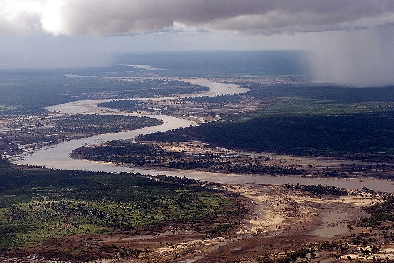In undertaking this exercise, GWPSA has been tasked with conducting in-country consultations with the key stakeholders and institutions dealing with the problems that are being addressed by the strategy. This will facilitate the verification of the identified issues and build recommendations into the proposed DRR Action Plan for the Limpopo Basin.
In light of this, between the 25th and 26th of September 2014, consultations were conducted with key stakeholders in Botswana namely: The Department of Water Affairs (DWA), Disaster management Init in the Office of the President, Kgotleng District Council – disaster management unit, and the University of Botswana.
The following were identified as some of the challenges highlighted that militate against coordinated disaster risk reduction. There is lack of adequate resources such as money and capacity. There is also lack of communication among departments and even districts which usually poses challenges in the event of a disaster. There are good policies in place however there is no harmonisation of policies towards a common goal especially with regards to disaster management.
In this regard, expectations raised by the four institutions on the role LIMCOM can play in alleviating disasters in the Limpopo Basin can be summarised as follows:
- Awareness creation - Floods are a rarity in Botswana, hence such kinds of disasters are not properly understood or appreciated hence the need for awareness creation and also assistance in the setting up stations that provide real time data.
- Promote community awareness – There is lack of understanding around disaster management issues and in some cases communities do not heed early warnings and LIMCOM can assist by supporting community awareness
- Capacity development - There is need for capacity development to promote skills such as modelling for scenario development. This will not only equip the country but might assist in bringing some of the partners on board.
- Establish a LIMCOM Disaster Management Committee (DMC) - It is also imperative for LIMCOM to establish a DMC and also promote that a single data collection and analysis system be used for the entire basin by the riparian countries.
- Encourage cooperation - There is need to bring together disaster management officers from different countries, departments of water affairs and other stakeholders so that they plan together.
- Highlight existing linkages – It is important for LIMCOM to show the linkages between countries so that departments of individual countries are informed and can plan accordingly.
- Promote disaster management coordination - LIMCOM should organise disaster management teams from other countries to visit disaster struck countries so that they can appreciate disasters, learn and maybe plan better.
- Establish a disaster management centre – LIMCOM needs to establish a disaster centre that will communicate and repackage information.
- Facilitate funding – LIMCOM should facilitate funding for neglected water related research areas such as groundwater.
- Establish a repository for information – LIMCOM needs to develop a repository for information that will be available even after the completion of projects.
- Facilitate disaster management – LIMCOM can play a disaster management facilitator role and enable disaster management representatives from different countries to meet and share information.
- Indigenous knowledge - Promote the integration of indigenous knowledge in the planning process
In-country consultations will also be carried out in Zimbabwe, South Africa and Mozambique. The expected output of this activity will be an Action Plan detailing recommendations and mechanisms for facilitation of implementation of the Limpopo Basin Strategic Plan for Reducing Vulnerability to Floods and Droughts, under the auspices of the IWRM Plan of LIMCOM with the intent of reducing the vulnerability of human settlements and ecosystems to floods and droughts in the Basin in the face of climate change.
